#like it's fun to engage with the stuff a writer/director/whoever thinks about their art
Explore tagged Tumblr posts
Note
hi!! i know u talk a lot about aromanticism a lot on here, but i don’t think i’ve ever seen u talk about aromantic anthy. would u mind discussing/elaborating on it or linking to a post where u do because i’m very curious!!
i got a similar ask half a year ago or something ridiculous like that on my main blog, but i’d like to really do justice to my url right now and explain it in more concrete terms.
i will say, it’s important to bear in mind that this reading of anthy’s character is very much informed by my own experiences, and a lot of those experiences are ones im not keen to talk in depth about. but you know. let’s make some nebulous gestures towards ideas of being traumatised, being autistic, struggling to meaningfully connect with others and honestly not really wanting to do such because of how they treat you.
like ive previously said, an aromantic perspective on the world would, i think, really benefit anthy. when youve lived your whole life experiencing violence at the hands of these patriarchal structures, of which romance is absolutely one, it’s kinda like. damn. im uncomfortable buying into those ideas.
anthy also has this lovely line in ep 19 where she says to utena ‘romance either happens or it doesn’t’ and it’s just sooooooo. so very interesting to me, actually, that anthy would say something so black and white about ‘romance’, a topic that anthy knows better than a lot of rgu characters is hopelessly confused and arbitrary and often enabling violence. and utena (fellow aromantic gaybo) says 'yeah, i know, but...'. these simplifications, these elisions. what is and isn't articulated. but what? maybe things are much more complicated than we'd like to think.
anyway enough of that tangent. one thing i as a trans and aromantic person always return to when discussing trans and aromantic readings of characters/texts more broadly is that there's no singular piece of evidence that can really cement these readings as Undeniable. it's like. okay. there's a critique of romance as a patriarchal structure in revolutionary girl utena. there's an ambiguity about anthy's feelings towards characters like utena, where there is clearly a queer connection but it takes shape in unconventional and complex ways. me, i'm aromantic, i see all of these pieces and i go oh well that's because she's an aromantic lesbian. you know, there's plenty of little moments i can evidence but those moments can be used to argue for an alloromantic lesbian anthy too. romance is a very arbitrary thing and i think everyone should take their own approach to it unapologetically. of course, mine is that it's hellish and i want nothing to do with it, but im just one guy. and im okay with that. i feel strongly about this reading and it is personal, and id be dishonest to say otherwise, but i do also find that it's well-evidenced in the text. as one of my lecturers once said, don't worry about authorial intent, it isn't real <3
#and authorial intent is NOT real i really cant emphasise that one enough#like it's fun to engage with the stuff a writer/director/whoever thinks about their art#and it can be very useful#but it's not definitive. that's not the last word on the topic#like did be papas consciously write any rgu character as aromantic? idk probably not#but i find such powerful aromantic narratives and themes coming through in this show#in how it chooses to examine relationships and power dynamics and the pervasive nature of romance as a concept#how it is so easily unequal how it is DESIGNED to be unequal how it offers chivalry and safety to mitigate harm#which it directly enables. makes easier#and that doesnt mean that aromanticism is the only solution bc you know. some ppl do feel romantic attraction#but it's like ok let's rethink 'romance'. let's combat amatonormativity let's challenge the relationship hierarchy that privileges#families and romantic partners in such a dangerous dangerous way#and i see all of that in this show and it resonates so deeply with my experiences many of which pertain to aromanticism#and you know. this show made me accept that im aromantic. so i think that speaks to how strongly these themes come through#but i digress. i find it hard to talk about this stuff bc its deeply personal and quite arbitrary#and also every time i do someone sends me anon hate about how i hate gay people. which is so cool btw please keep doing that#i didnt realise that loving being gay and loving gay people and loving when gay people love each other made me homophobic /s#just to clarify for the second time that is all sarcasm im gay and aromantic and i dont have time for arophobia here#anywayyyyy#im aware of all the asks ppl have sent me. im working on it i prommy <3#dais.txt#dais talks aspec
14 notes
·
View notes
Link
Kristen Stewart is having a huge moment in her career with Charlie’s Angels coming to theaters in November and Underwater coming in January. But so far the 29-year-old has been focusing her energies on promoting her independent movie Seberg, the tragic story of American actress Jean Seberg whose life was essentially destroyed by late ‘60s FBI surveillance when she supported the Black Panthers and had an affair with one of their leaders. Stewart is keen to spread the word about Seberg on the 40th anniversary of her death at age 40.
In Venice, at the world premiere, she admitted “we should definitely know her for more than her short haircut and movies.” Stewart then moved on to the Toronto, Deauville and London Film Festivals. Though her biggest splash was made at the Zurich Film Festival, where she gave a Masterclass, a press conference, and where I sat down with her for an exclusive interview. Seberg comes out through Amazon in December.
COLLIDER: You seem to be doing more promotion for Seberg than Charlie’s Angels. Is there a reason for that?
KRISTEN STEWART: It’s funny you mention that as I was thinking about that this morning. Maybe it’s just been a minute since I was really proud of a smaller movie that I’ve done. I’d like people to see this one and unless you go to festivals and engage with the cinematic culture that could give you that opportunity to be seen, there’s no way to do that. So I support this movie, I think it’s good, and I think it’s a good time to tell the story. It’s been cool to travel with it because I also just love the festival vibe. I like traveling around and talking to people about movie stuff. It doesn’t feel like I’m selling a film. It feels like I’m supporting it and getting it out there for sure, but not in a way that it feels like my job. It’s a nice way to complete the experience of making a film. You get this opportunity to articulate the reasons why you made it and it completes the process.
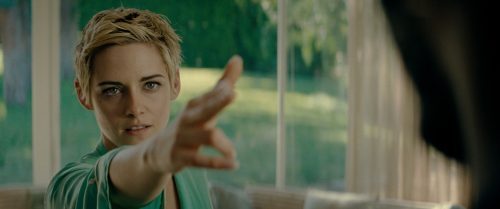
How did you come to work on the film, which is the second film by Australian, London-based theatre director Benedict Andrews? It’s about the life of Jean Seberg but is not a straightforward biopic as it concentrates on the fraught period of her life.
STEWART: I spent a bit of time on the jury with Cate Blanchett in Cannes (2018) and I’d just met Beno and was thinking about working with him and she immediately said, “Do it!” She’d worked with him on stage, he’s done a lot of opera, a realm I knew very little about. His first film Una was so incredible and so contained, just an undeniably original movie. When we had our first meeting about Jean he felt so precious and particular and his protective nature felt really contagious and he made me want to get to know her. At that point I’d only seen Breathless and learning about the story I was wildly blown away by the fact that we don’t know what happened to her and why she receded and became somebody we lost too early.
Is it possible now for an actress or even a woman who is political to be blacklisted by the US government as Seberg was?
STEWART: No, I don’t think so. A lot of people are speaking against Trump, a lot of people are speaking against things they’re not into and they’re speaking very loudly. There are just too many of us now.
Seberg was also crucified because of her sexuality, for being with a black (married) man. Your life has been in the tabloids so you must be able to relate to that.
STEWART: Yes of course. I come from a staunchly moral country as if we all share those rules. As if there could possibly be a set of rules that applies to everyone and their own individual happiness, which is absurd. But at least we’re talking about it a little more than we ever have.
It’s actually a good time to be a woman in this business with #timesup.
STEWART: I think it’s such an exciting time to be a woman who’s allowed to make films right now. There are so many stories that are going to be unearthed that have otherwise been ignored for a long time. Not that some of those stories won’t be told by men. There will be a trickle down effect. Some of my favorite experiences have been with male directors. We’re just becoming more honest about the female experience and that’s very exciting.
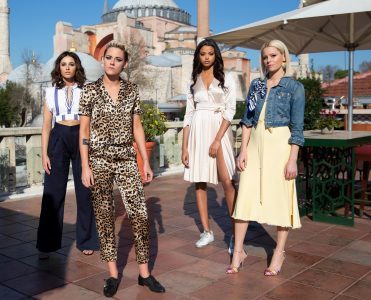
How was it making Charlie’s Angels directed by Elizabeth Banks, who also plays Bosley in the film? Was it fun?
STEWART: It was really fun. Liz is really funny. It was her idea to revive the movies. I’d never worked with her before but I’ve always been a huge fan. Tonally we’re so different—she can squeeze a joke or a laugh out of anything and I’m the furthest from that. So I was so shocked that she saw me like that, like, “Hey you’re a goofball and I think we should play around together because nobody does that with you.” And I was like, “What? But you’re right, nobody ever does that with me.” So she got in there and it was this really tender act and I was so thankful and ultimately she wrote a really warm, grounded—also very silly, stupid, sometimes slapstick—but also really well-intentioned movie. It’s rad. She took this story we’ve grew up with and took the superhero aspect out if it and made the girls really relatable and accessible but also very aspirational. There’s this network of women across the globe who are connected and are really unstoppable. So it’s not like there are these three unattainable women who can fly or do kung fu while suspended in the air. No, these girls are actually smart and it’s about women who are friends and who are good people working together. It’s like a women-at-work story that’s also absurd sometimes. It didn’t lose the kitschy thing because she’s fucking silly.
Are you a goofball yourself?
STEWART: Mmm, sometimes.
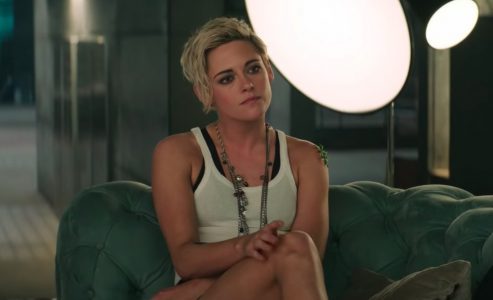
Did you enjoy the comedy/action?
STEWART: My character is wily. I’m the really irresponsible older sister who takes care of these girls. Sabina would take a bullet for you but she never really knows what time it is or where she’s supposed to be. So it was fun to be just a dumb-ass.
Do you want to do more of the fun dumb-ass? I guess it has to be with exactly the right person like Ellzabeth?
STEWART: I would love to play around a little bit more. I like serious movies but yes of course.
You’ve directed a short film and a few music videos and now you’re about to direct your first feature The Chronology of Water based on the memoir by Portland-based writer Lidia Yuknavitch. Why has this story captured your imagination so much?
STEWART: It was such an incredible experience reading the book. Sometimes you encounter material that articulates something you aren’t able to yet feel within you and it’s striking as hell when someone does it for you. It’s an exceedingly cool time for women to tell stories right now, the perspective is changing and I thought this was so real. This woman is a brilliant writer and uses language and plays with words in a way that I’ve never seen before. Also there’s a coming-of-age story embedded in this thing that is so confronting and not just raw for the sake of being startling, but is actually real. I don’t think it’s impossible for the male perspective to tell epic female stories, it’s just that this is so embedded in this book about a woman processing pain and shame and repurposing it and creating art as savior. It’s sort of this art-as-savior and swimming-as-solace story. It’s a real-word, body-fuck story. The way she inhabits a body and the way she speaks about it is unlike anything I’ve ever read. So I want to see it; I’ve never seen that in a movie.
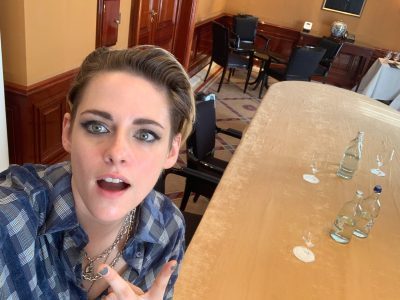
Are you writing the script or are you working on it together with Lidia?
STEWART: It’s definitely a collaborative process, but I’ve adapted it. It’s such a choose-your-own-adventure story. Whoever would have ended up making it, it has to be your own take on it. There’s so much to be had, it’s so non-linear, it’s so transient. It’s like water; it’s impossible to slip down the same stream.
Will you star in it or will you stay behind the camera?
STEWART: I’m not really right for it. Whoever plays the lead needs to play 17 to 40, so it’s a really wide range. I don’t know who that is at the moment. Hopefully I’m going to direct it next year.
With Twilight did you know how big it would become when you agreed to play Bella?
STEWART: The books were a big deal in the young adult novel realm, but it wasn’t in popular culture yet. I hadn’t heard of the book at that point and thought I was auditioning for a normal movie. It didn’t stand out as this gaping opportunity, it was just something that I liked. That was a cool audition process too. Catherine [Hardwicke] and I worked together for ages auditioning a bunch of other people for all the other parts. It was very normal—until it wasn’t.
What did you enjoy about playing Bella?
STEWART: When you read that book you are her. It’s such an immersive experience. So more so than with other parts the way to get close to it and make it feel true was to really own it and make it my own rather than be faithful to a text. I guess you can say that about most work, but this in particular was fun to be there. I was a teenager, it was such a visceral time to be alive and any 17-year-old knows what I’m talking about. It was just about capturing something so immediate, that first awakening, that ownership of your body and desire, all of it. It’s like having people tell you that it’s wrong and what you shouldn’t do. It’s a fierce commitment to something you believe in and was such a cool story to tell at that age.
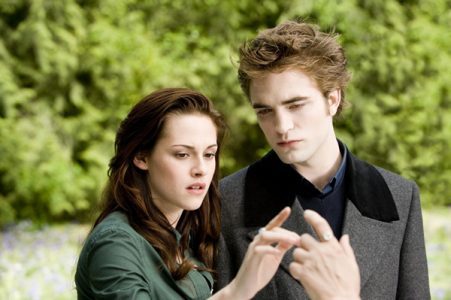
You made five Twilight movies. Do you still see other cast members? Do you have a big WhatsApp group?
STEWART: We all have a group chat (jokes). But we all see each other, I run into people all the time. I can’t make it to Taylor’s Halloween party, which bums me out, I’m going to be in New York. Rob’s great, he’s doing well, he’s going to be Batman and I’m very proud of him. It’s nice. In terms of the group we’ve all disbanded now for so long. I have individual relationships with everyone, but it’s not this thing that you would assume binds us in this way where we go, “Remember that?” We’ve all become real whole people who still know each other. I’m really thankful for that.
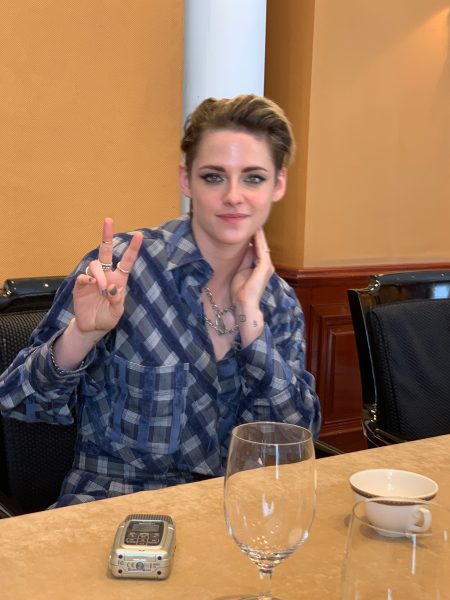
35 notes
·
View notes